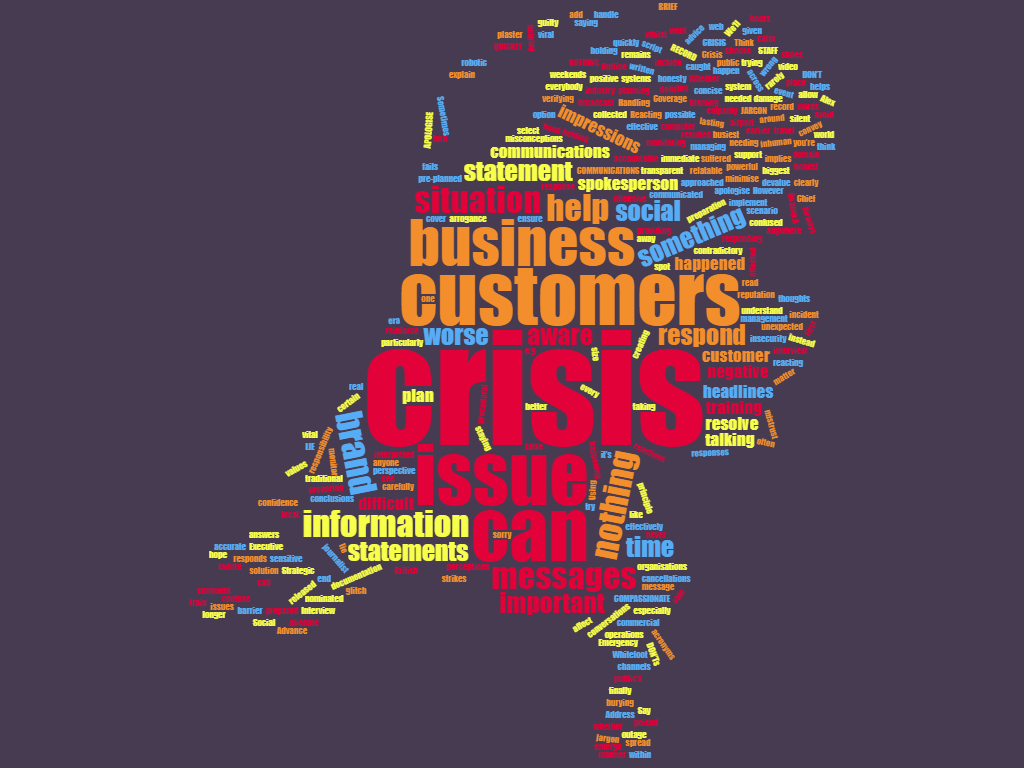 It may not happen very often, but at some point in time, every business may need to implement a crisis communications plan. Sometimes things go wrong for a business and for its customers, and it’s how the business responds that can make or break a brand.
It may not happen very often, but at some point in time, every business may need to implement a crisis communications plan. Sometimes things go wrong for a business and for its customers, and it’s how the business responds that can make or break a brand.
One of the biggest PR fails happened earlier this year in the commercial industry. British Airways suffered a major IT outage which resulted in 75,000 passengers around the world facing two days of cancellations after a computer system failure caused chaos during one of the busiest travel weekends of the year in the UK.
However, it took BA Chief Executive, Alex Cruz, two days to apologise to passengers after the incident. And when the PR statement was finally released, BA went on the offensive denying it was their systems at fault, instead blaming airport operations for the “glitch”, which was not the case. BA took too long to respond and too long to give customers accurate information which in turn caused the devalue and mistrust of their brand.
This size of crisis is rare but the principle of crisis communications remains the same, not matter the scale – words and reactions are powerful so you need to choose them particularly carefully. The way you respond to a crisis can affect your brand values and your customers’ perceptions, especially when social media channels can spread news so quickly.
DO
- APOLOGISE
Say sorry, take responsibility of the crisis. Make sure you are aware of the immediate facts of what has happened and be accountable for the issue.
- REACT QUICKLY
First impressions are lasting impressions for customers. Reacting within the first hours of the crisis happening will help put the fire out. Don’t add fuel to the fire by not responding. Be honest and transparent about the issue to avoid misconceptions. Address the issue and how you are going to resolve it. A holding statement is a great option whilst you are still fact-gathering.
- BE COMPASSIONATE
Put yourself in your customers shoes to understand how they will be affected by the issue. Don’t issue a robotic, inhuman response of “We’ll look into it and get back to you” or read from a script, which could be interpreted as a lack of empathy. Work with your customer to resolve the issue and how you can make things better. Social media is a great way to monitor a crisis and see the conversations taking place in real time. This can give a perspective and scale of the situation which can lead to a more effective solution for your customers.
- BRIEF YOUR STAFF
Make sure your staff are aware of the issue and who the nominated spokesperson is for when media call. It is important to select and train a good spokesperson who will be poised, calm and collected and ready to speak in case of a crisis. Have statements prepared for web, social and traditional media, whether they be written or video. Make sure staff are aware of the key messages if approached by anyone. There is nothing worse than confused or contradictory statements.
DON’T
- PANIC
This won’t get you anywhere. The issue won’t go away and burying your head in the sand will only allow the media and your customers to draw their own conclusions. A clear head is needed in a crisis and the messages you are convey to the media have never been more important. Make sure you have all the facts first.
- DO NOTHING
There is nothing worse than staying silent or saying, “no comment”. A crisis will rarely blow over, not in the era of social media and news going viral. If you say and nothing during a crisis, the media will think you are “guilty” or have something to hide which will only reinforce the public’s negative thoughts about the situation. You do NOT want everybody else talking about you – you should be doing the talking! Think of the crisis like a plaster, the longer you take to respond, the more it will hurt your business, brand and customers.
- LIE
Even worse than doing nothing is to lie about the situation. If you don’t have or cannot pass on certain information at a given time then it helps to explain why, e.g. “We are still verifying the situation” or “We don’t have that information at this stage.” Do not try to cover the crisis up or give false hope or information. This implies insecurity, arrogance and lack of honesty of a business to a customer.
- USE JARGON
In a crisis, it is important that your messages be communicated in a clear, concise and relatable manner. Using business jargon and acronyms will alienate your customers and the media by creating a barrier between you and will confuse the messages you are trying to put across.
- SAY “OFF THE RECORD”
There is no such thing as “off the record” to a journalist. If you don’t want something to be in the public domain, then don’t say it and get caught out. Keep your answers to the point and ensure your message is made clearly.
Crisis management with Hornby Whitefoot PR
Handling the media with confidence is vital when bad news strikes and negative headlines loom. Even the best organisations can find themselves in a difficult spot through no fault of their own, and end up needing help with the media.
Whether you find yourself facing a sensitive local issue, managing a business crisis or reacting to an unexpected event we can help you to minimise the damage… and emerge with a positive reputation on the other side.
Hornby Whitefoot’s support can include helping you with a crisis media plan, preparing pre-planned media statements and providing media training – so you’re as ready as possible to handle difficult issues effectively. We may even be able to help keep something out of the headlines.
- Strategic and scenario planning and advice
- Emergency and crisis procedural documentation
- Print and broadcast media and interview training
- Outline statement pre-preparation
- Advance Q&A preparation
- Interview hand-holding
- Coverage monitoring and further responses
